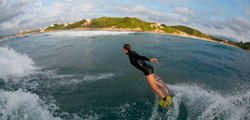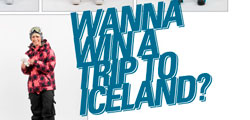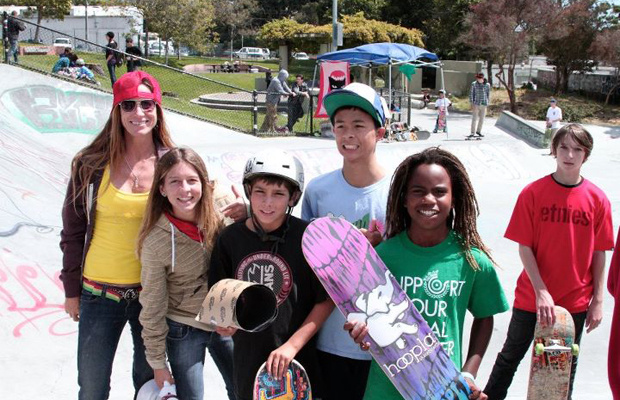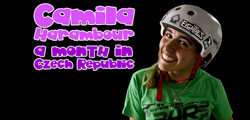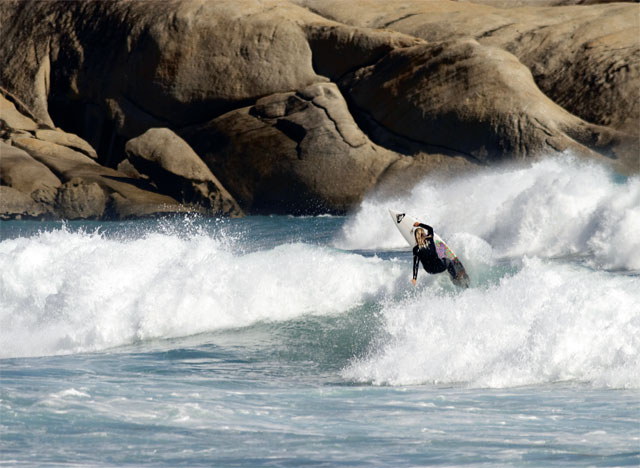
In each issue of our print mag, we give you the lowdown on a city that you should travel to with haste. But instead of trying to researching ourselves, we ask locals who know said city inside out, like Miles Masterson from Cape Town in South Aftrica.
Cosmopolitan party capital and one of the first European settlements in Southern Africa, the “Mother City” of Cape Town is multicultural and diverse, with a traditional African heart and a progressive Western outlook. It’s a traveller’s dream. While the nightlife is rad and a rich mix of global nationalities and colonial sites and legacies allow for much sightseeing, the best feature of the city is its mind-blowing beauty – mountains, beaches and wilderness reserves so stunning they trump anywhere else in the world.
The most obvious landmark is the mighty Table Mountain, which towers over the “City Bowl” with protective granite arms. Behind it stretches the Cape Peninsula, which divides the city like a great dragon’s back. On the apex of the mountain you’ll get vertigo from the views of bays, slopes and suburbs clinging to the foothills, just begging to be explored.
But your first stop will probably be the City Bowl. The CBD of Cape Town is a place where creativity flourishes and cool people live, work and play. The scenery makes Cape Town one of the most sought-after movie and still shoot locations in the world. And what this means is that during the summer months there are planeloads of beautiful boys and girls around, and a thriving party scene, with super-trendy picturesque beaches on which to nurse your hangover and be noticed depending on your particular priorities that day.

Drinking
For a good night, start in Long Street. South Africans love to drink and “joll” (party) and, joined by throngs of travellers from all over the world, you can find any number of pubs and clubs here. If you’re keen on a distinctly African flavour, Mama Afrika, (178 Long Street) should be your first stop. The suitably decorated restaurant and bar offers a smorgasbord of African fare and there are live music performances from kwaito (a South African form of hip hop) and African jazz bands almost every night. Joburg in Long Street is another hang-out popular with the hipster set, as are nightclubs such as nearby Fiction and The Assembly (61 Harrington Street, District Six), where live underground acts rock the crowd to the early hours. Another cool spot in Woodstock (373 Albert Road) is the Old Biscuit Mill, a popular live venue where international bands play. There are also a number of beachfront and seaside bars such as the Brass Bell in Kalk Bay, La Med in Clifton, Caprice in Camps Bay and the Blue Peter in Tableview, where you can dance to local DJs as the fiery sun sinks slowly into the Atlantic. There’s also a thriving trance party scene in Cape Town if that’s your thing. Cocktails and shooter combos are pretty popular, though try a “Drunken Springbok” at your own peril.
Shopping
Near Long Street is the famous tree-lined cobblestoned Greenmarket Square in the heart of the CBD, a great place to haggle and pick up bargains on all sorts of African ephemera. The city itself contains stacks of incredible little independent stores and boutiques along its narrow streets and down adjacent St Georges Mall, where you can explore and pick anything from Africana to vinyl records and locally made clothing. More conventional, air conditioned shopping experiences in brand name stores include the Victoria and Alfred Waterfront overlooking Table Bay and the vast Century City in the northern suburbs. There are also many street and roadside craft vendors and open-air markets, including one at the Old Biscuit Mill every Saturday and in Hout Bay every Sunday, about 20 minutes drive out of the city.
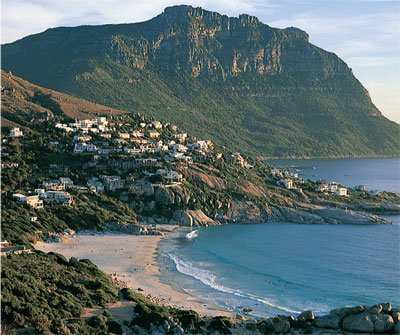
Sleeping
The City Bowl itself offers heaps of accommodation. With a well-regulated tourism industry most hostels are clean and well-run, plus good value for money. Long Street Backpackers was one of the first of its kind in Cape Town and is still a popular first stop for most visitors to the city. But there are literally hundreds of similar establishments, including areas nearer the coast such as the Sunflower Stop in Green Point (opposite Cape Town’s 2010 FIFA World Cup Stadium). Hardcore watersports enthusiasts should check out options in the areas of Tableview, Kommetije and Muizenberg though too.
Eating
If variety is the spice of life you’ll find a hefty dose of it in Cape Town restaurants. Though a bit pricey when compared to other establishments, the above mentioned bar, Mama Afrika, is a great place to sample exotic indigenous cuisine such as Ostrich, Springbok and even crocodile, or traditional African chicken and fish dishes. Another place nearby to sample local fare is Nyoni’s Kraal (98 Long Street) which features Cape Malay curries, the South African “braai” (barbeque) and even Mopanie worms! Apart from these, Cape Town offers a huge selection of good fish restuarants (try the Cape Town Fish Market, Dunes in Hout Bay or the Brass Bell) as well as Malay and Indian. South African fast food is generally more wholesome than the rest of the world too, and chains such as Nando’s and Steers offer great value. Though no visit to Cape Town would be complete without knocking back a gourmet burger from Café Royale (273 Long Street).
Culture and Adventure
Cape Town offers a host of cultural attractions from contemporary art to scenic and adventure sports. Cape Town Castle in the foreshore is the oldest building in the country and contains a well-preserved insight into the Dutch and British Colonial eras. A short ferry ride will take you to Robben Island, home of Apartheid prisoners such as Nelson Mandela and a visit to Rhodes Memorial or Kirstenbosch Gardens are another two noteworthy attractions with spectacular views and historical insights. And let’s not forget the obligatory cable car ride up Table Mountain (warning – get there early, the queues are loooong).
Cape Town is a great place to surf for everyone from beginners to big wave aficionados (get down to the warm water surf mecca at Muizenberg for beginner’s lessons at Gary’s or the Roxy Surf Schools or check out capetownsurfingadventures.com). It’s also sweet for kitesurfing and skateboarding (check out sagra.co.za for downhill skating or sentinelboardriders.com for info on street skating and the city’s only skatepark in Hout Bay), rockclimbing, mountain biking, sandboarding and skydiving (downhilladventures.com). Whatever your adrenalin rush of choice, you’ll be catered for. Or if chilling on the beach with the style set is more your style check out Clifton, Glen Beach, Camps Bay and Llandudno. But be warned, while the beaches are hot in more ways than one, the water on the Atlantic side is usually freezing.
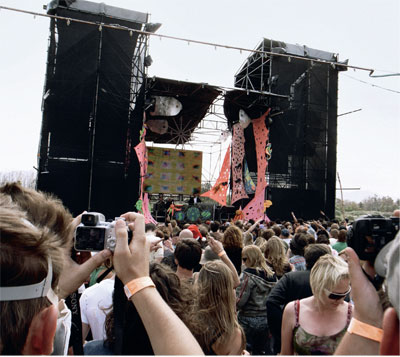
Rough Prices
Due its slight rich people’s playground tendencies, Cape Town is not as cheap as most other big cities in South Africa. But the exchange rate is nonetheless favourable to most overseas visitors and there are always bargains to be had.
Accommodation/night:
Hostel/backpackers – 8 to 20 Euro
Basic Hotel – 30 to 60 Euro
B&B – 40 to 80 Euro
Monthly bedsit – From 200 Euro
Food:
Burger and chips – from 2 to 4 Euro
Three course meal – 15 Euro up
Internet usage: from 0.7 Euro up
Club cover charges: 0.7 Euro to 5 Euro
Drinks:
Beer/Cooler/Wine: 1.20 to 2 Euro
Shooters: 2 to 3 Euro
Cocktails: 2 to 4 Euro
Taxi ride: 0.65/kilometre
Transport and Danger
These are two key elements that can make or break any trip you might undertake to South Africa. While there is a sufficient infrastructure of cheap buses and trains in Cape Town’s surrounds that run on time, they can be a dangerous place for the unwary. Conmen, muggers and pickpockets do operate here and at the risk of putting you off after so much positive affirmation, is that the threat of more serious crimes such are a constant reality. But if you are on your toes and play it safe, you’ll be fine. The best is to hire or buy a small car to get you around or alternatively call for a taxi (021 4344444) or catch the three-wheeled Tuk-Tuk taxis in the City Bowl.
Some safety tips:
– never travel too far on foot from your hotel by yourself
– always travel in groups of three or more if possible
– never trust strangers and don’t ride in unaccredited transport or accept lifts from people you don’t know
– always watch your drinks (date rape spiking is a problem in South Africa)
– never drink too much and walk back to your hotel
– never go to or stay anywhere that makes you uncomfortable
– never wear too much baling or flash too much cash
– always carry mace
– never be too paranoid, you’ll be fine, but always be aware of what’s going on around you


